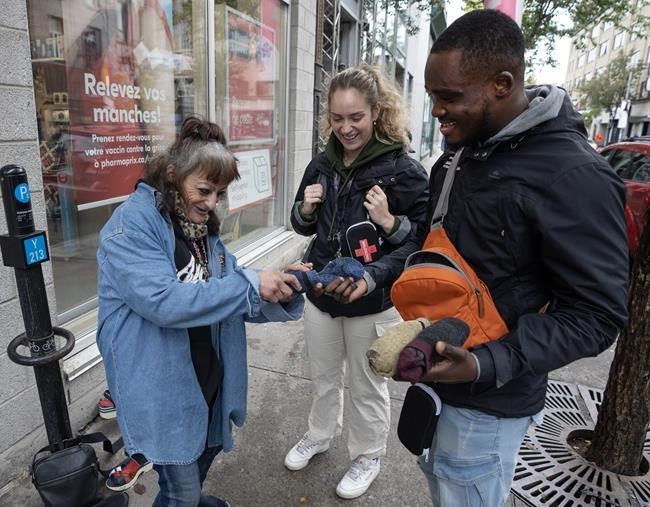MONTREAL — Equipped with a case of naloxone and a backpack of warm socks, two members of Montreal’s social intervention team peer around the side of a dumpster behind a downtown McDonald’s, looking to see if someone needs their help.
Wolf and Rosalie — who can only be identified by their first names at the insistence of their employer due to the sensitive nature of their work — are members of the city’s mobile mediation and social intervention team, or EMMIS. The team was created in 2021 to respond to situations involving vulnerable clientele such as those who are homeless, intoxicated or in crisis in public areas, often as an alternative to calling police. The squad now has 32 members patrolling four boroughs, and the city hopes to expand it.
However, as the need for their services grows, members of the team say it's getting harder to fulfil a key part of their mandate — helping people find space in a shelter or get specialized health care. Often there aren't any places available.
"Places in shelters are very limited, sometimes we don’t know where to refer them,” Wolf said as he walked down the street. “What we’d like is more spaces, especially for women.”
On this day, there is nobody behind the dumpster, meaning they won’t need to use the naloxone they carry to reverse an opioid overdose. Before moving on, the pair make a quick visual scan of the discarded syringes littering the ground, making sure there are no needles.
Moments later, they’re approached by a tall, soft-spoken man in a wool hat, who asks for help reserving a spot in a local shelter. Wolf pulls out his phone, but the encounter ends in disappointment: the shelter is closed for the next two weeks due to a bedbug infestation.
On one recent occasion, Wolf said, he was approached by a man who said he was ready to go to detox, and waited with him for more than six hours while the team made calls and tried to fill out the paperwork to admit him. In the end, the centre didn’t have enough staff, and the man was sent to a shelter at a former YMCA in Chinatown that the workers describe as their "last resort."
“That was a real shock to me, because this man wanted it,” he said. “We work with such a difficult clientele, that when you get the chance to find someone who wants (help) right away, you have to seize that opportunity.”
Alexandre Desjardins, the team's director, confirmed that the lack of sufficient resources is a daily challenge.
"It's true that a lot of shelters, a lot of resources, are full," he said. He said the team is lucky to have a vehicle and is almost always able to find someone a space after calling around, although it may be far from where they live, which "isn't the best solution for the person."
As the number of 911 calls that deal with mental health and homelessness has risen, Montreal has increasingly turned to so-called mixed squads — which pair police with health or social workers — or to EMMIS as a way of addressing criticism that the police response is too harsh.
But a report released in September based on interviews with street outreach workers suggested many of them felt such squads do more harm than good.
The paper, published by a Concordia University geography professor and a Montreal-based advocacy network called RAPSIM — the Réseau d’aide aux personnes seules et itinérantes de Montréal — found the squads favour the interests of residents and businesses "who don't want to see poverty" over the needs of those experiencing homelessness, and take up financing and resources that could be directed toward helping those in need.
Ted Rutland, the professor who co-wrote the report, said EMMIS has a "muddy" mandate that claims to both respond to citizen complaints and help the homeless — which are often fundamentally at odds.
"You can't at the same time say, 'I'm here to help you, you can trust me, I'm here to help,' and then the next day show up to remove someone from a public space because you received a complaint," he said.
He said the squads' increased presence can complicate the work for other street workers because some homeless people avoid gathering in their usual places, and have become mistrustful of any workers who approach them.
Desjardins, for his part, says he believes there's "always room for more people on the ground," but believes the report highlights the need for better collaboration between groups.
On their rounds, Wolf and Rosalie repeatedly point out that they are not street outreach workers, and they say they’re appreciated in the community.
During the walkabout with The Canadian Press, they stop to talk to a gregarious 58-year-old woman in a jean jacket, who calls out to people passing her by on the sidewalk.
The woman, who gives her name as “Loulou,” confirms that the shelters are often full, and there’s “no place for us women.” She rocks back and forth on her feet, adding that she keeps moving to help her stay awake to ensure she won’t be robbed.
“Being on the street, us women, my God, it kills us,” she said.
The team spends a few minutes talking with her and offers a few suggestions of people who can help follow up on her social housing application. At the end, Wolf offers her a pair of socks and some knit gloves, eliciting a small cheer. “I think you guys are fantastic,” she says.
This report by The Canadian Press was first published Oct. 26, 2023.
Morgan Lowrie, The Canadian Press



